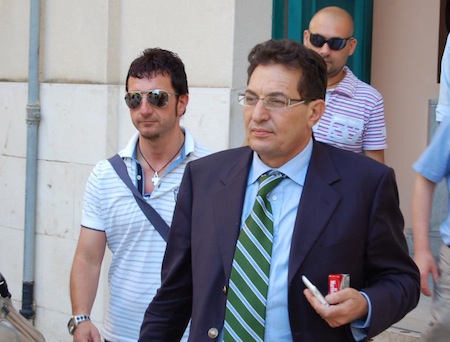

Today, one of Italy’s most iconic regions — Sicily — goes to the polls to elect the 90 members of its regional legislature and, indirectly, a new regional president.


For all the beauty of its landscape, the majesty of its architecture and the divinity of its food and wine, Sicily, the home of the well known Cosa Nostra, the Sicilian organized crime group that has become synonymous with the word mafia, is not the world’s model showcase for good governance.
Sunday’s elections come six month early after the resignation on July 31 of regional president Raffaele Lombardo, who was elected overwhelmingly in 2008, but stepped down under a cloud of corruption — depressingly familiar charges of complicity with the Sicilian mafia. The election also comes as a bit of a dress rehearsal for Italy’s expected upcoming general election (along with early elections expected soon in Lombardy as well) — just a couple days after former prime minister Silvio Berlusconi’s conviction in a Milan court for tax fraud.
Rosario Crocetta (pictured above, top), the leading leftist candidate for president and the mafia-fighting former mayor of Gela (Sicily’s sixth-largest city) would be Sicily’s first openly-gay regional president and has campaign marks the best chance of the center-left in a generation to govern Sicily. But polling nearly as well as the broad center-right and the center-left is the new anti-austerity protest party, the Movimento 5 Stelle (M5S, Five Star Movement) of blogger and comedian Beppe Grillo — he made a splash by swimming across the Strait of Messina from the Italian peninsula to Sicily at the beginning of the campaign (pictured above, bottom).
In one way or another, each of the five main parties competing in today’s election in Sicily will be able to pull lessons from the result in advance of national elections that, although just six months away, remain incredibly fluid.
Italy’s technocratic prime minister Mario Monti, who was appointed in November 2011 to push through budget, tax and labor reforms in the midst of an Italian sovereign debt crisis, remains popular, but has said he won’t run in his own right for election (although could remain available to head a future technocratic government).
Berlusconi had pledged as recently as last Wednesday that he would not run for prime minister as the leader of his own center-right Popolo della Libertà (PdL, People of Freedom), though the unpredictable former prime minister has already said he plans on staying in politics to some degree. Yesterday, in a Nixonesque, hourlong rant, the enraged, newly-convicted Berlusconi hinted he might even try to bring down Monti’s government to bring forward a snap election even sooner, lashing out at Monti, German chancellor Angela Merkel, former French president Nicolas Sarkozy, and a ‘judge-ocracy’ that he says is ruling Italy. With plenty of money and control over Italy’s private media, he’ll be able to influence politics as long as he wants. Currently, the PdL secretary is Angelino Alfano, a 41-year-old former justice minister who is from Sicily and rising star who’s thought to be the leading contender to lead the PdL into the next general election.
Meanwhile, the center-left Partito Democratico (PD, Democratic Party) expects to choose its candidate for prime minister in November.
With 5 million people, Sicily features just around 8.5% of Italy’s total population. Despite a national GDP per capita of around $31,000, Sicily’s is something like $19,000, vying for Italy’s poorest region with a handful of other southern provinces — it’s nearly half the GDP per capita of the richest province, Lombardy (around $39,000).
In the prior regional elections in 2008, Lombardo led a center-right coalition that included the PdL, the Unione di Centro (UdC, Union of the Center), remains of what used to be the once-formidable Christian Democratic party and his own regionalist Movimento per le Autonomie (MpA, Movement for Autonomies) and together won 65.4% of the vote and 61 of the 90 seats in Sicily’s regional parliament. A PD-led leftist coalition, headed by Anna Finocchiaro, won just 29 seats at 30.4% of the vote. The vast majority of the seats (80) will be chosen by proportional representation, with a 5% threshold for winning seats; an additional 10 members are elected with a block-voting system.
In today’s regional elections, though, there are five coalitions/parties, each fielding its own candidate for regional president — polls are hard to come by, but it’s a bit of a free-for-all.
Near the top of the polls is the PdL coalition, headed by Sebastiano ‘Nello’ Musumeci. Musumeci, a member of the European Parliament, is himself a member of a small autonomist right-wing party in Sicily, Alleanza Siciliana (Sicilian Alliance), having his roots in the now-defunct National Alliance, a stridently right-wing party which had neofascist roots. Although he’s not actually a member of the PdL, a broad win for Musumeci would bolster the PdL nonetheless and, in particular, boost Alfano’s chances of leading the PdL into the next elections — despite record-low polling for the PdL nationally, Alfano would be attempting to become Italy’s first Sicilian prime minister since Mario Scelba led the Italian government from 1954 to 1955.
Also at the top of the tolls is Crocetta’s PD-led coalition (also supported by the UdC). Crocetta’s election would be historic in at least two ways. Continue reading Today’s Sicilian elections showcase potential party strength before 2013 Italian election →
![]()



